Inflammation is at the basis of many types of heart disease, but eating certain foods can reduce heart inflammation. This simple guide explains why anti-inflammatory foods improve heart health and how to eat enough heart healthy foods to make a difference. It’s not as hard as it sounds!
Do you suffer from heart disease, or know someone who does? Most families these days have at least one member who is troubled by a heart ailment. The words “myocarditis” and “heart inflammation” are all over the news lately.
This is because the age range of people experiencing heart issues has widely expanded over the last few years.
Heart inflammation is most often a side effect of:
- Infections: bacterial, fungal or viral
- Surgical procedures
- Vaccinations
- Some autoimmune diseases
- Excessive stress, anger, anxiety
Inflammation, once you have it, can cause:
- Myocarditis
- Pericarditis
- Endocarditis
- Heart Attack
- Angina (some forms)
- Arrhythmia
The issue is – what can we do to about it?
Healing heart inflammation or any type of bodily inflammation doesn’t happen overnight. Natural remedies and wholesome diets are key to good health, and natural remedies can be amazing.
However, healthy changes in our bodies occur over time. That time frame varies from person to person, depending on condition severity and the dedication you have for working on your health.
If you already have inflammation and resultant conditions, you’ll have to take a varied approach to improving your health, over time. The important thing is to get started as soon as possible!
How Diet Affects Heart Inflammation
Eating anti-inflammatory foods can greatly reduce uncomfortable and sometimes dangerous heart symptoms.
Before you start adding certain foods to your diet, here’s one more important point:
The very first thing you can do to help heart health is to minimize those foods that are known to cause inflammation.
If you don’t do this, all of your good efforts of eating healthy foods will basically be canceled out by the baddies. Just in case you’re not sure what foods cause inflammation here’s the short list:
- Fried foods
- Junk food
- Foods high in refined sugar
- Low quality vegetable oils
- Foods that contain artificial and often toxic colorants, flavorings and sweeteners
- Factory farmed meats and fish
- Processed foods and preserved meats
- Sugary colas, syrups and bottled drinks
Not to be extreme, an occasional treat of these items will not overload your system and cause inflammation. But regularly filling your diet with these items is going to have negative results over time.
So, now let’s find out how you can get enough of the best anti-inflammatory foods into your diet…
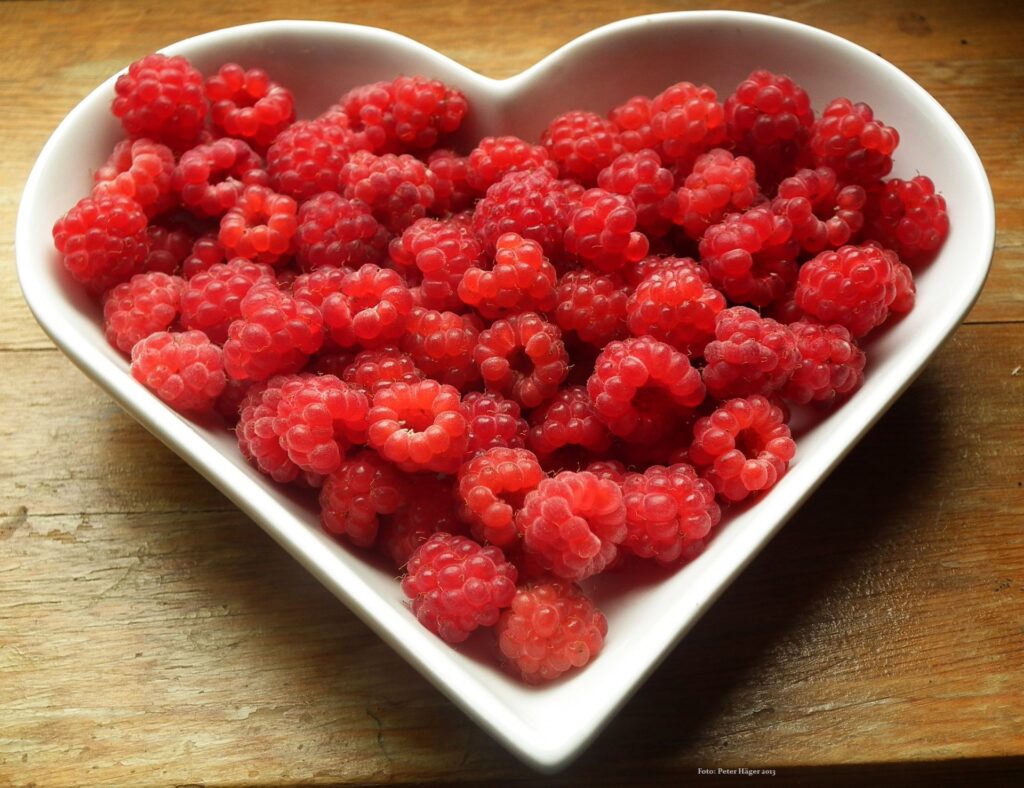
Foods That Reduce Heart Inflammation
The best anti-inflammatory foods fall into the category of “superfoods.”
Healing foods superfoods are just that: super-concentrated powerhouses of nutrients that are excellent for many reasons. And, most of them help more than one health problem.
So, let’s go over the list and learn what each food can do for your heart health.
1. Green Cruciferous Vegetables
Cruciferous vegetables are members of the Brassicaceae family. These plants are also known as Cruciferae (or cruciferous) as they can be identified by their flowers that have four petals resembling a cross, as in the image below:

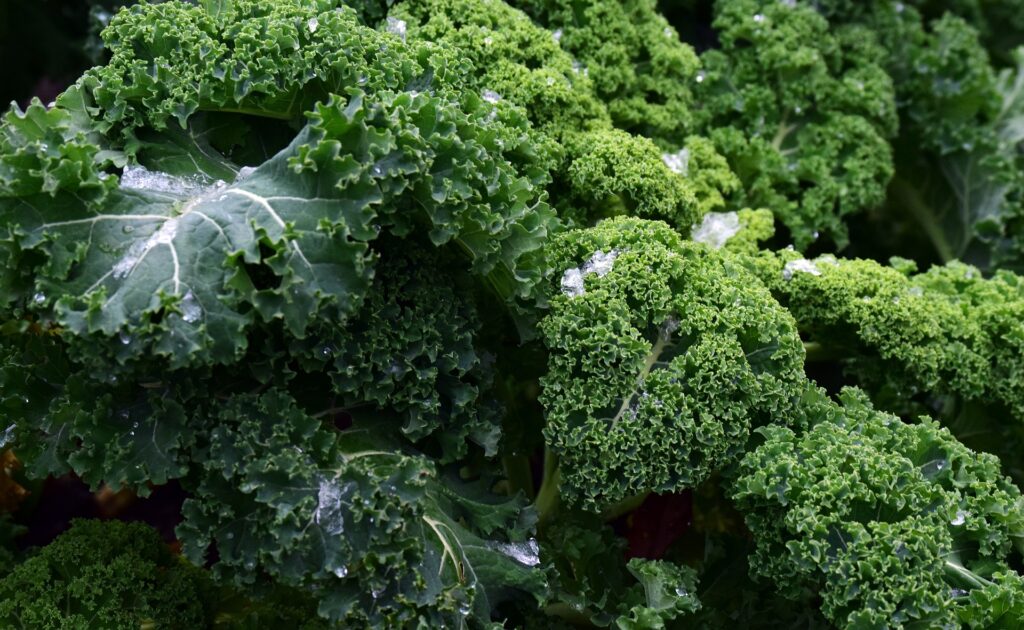
Aside from being packed with essential fiber and essential vitamins A, C and K, green cruciferous veggies contain many anti-oxidant plant chemicals.
These natural plant constituents include nitrates, sulfur-containing glucosinolates, and polyphenols. They have fantastic anti-cancer properties and they also reduce inflammation. That means they’re very important for heart health.
This plant family includes veggies and greens such as:
- kale -all varieties
- turnip greens
- collard greens
- broccoli
- brussel sprouts
- bok choy
- arugula
- cabbage – all varieties (juice)
- radish greens (juice)
- mustard greens
Now, here’s the vital point. Some “experts” such as nutritionists and dietitians say that all you have to do is eat about a cup of green veggies per day to “prevent heart problems.”
Ok. But what if you already have heart problems?
Granted, eating a diet full of healthy foods can help avoid inflammation and help to keep you healthy. But if you already have an inflammation-based heart (or other organ) ailment, you can get an additional punch of green veggie goodness by taking a concentrated green veggie powdered supplement along with your fresh wholesome veggie-infused diet.
You need a huge punch of green veggie nutrients every single day to correct a previous inflammatory problem! Green veggie powder can be added to smoothies, juice, or protein drinks.
Note: if you have an underactive thyroid, you should avoid eating large quantities of raw cruciferous vegetables and raw cruciferous leafy greens because they can additionally slow down thyroid function.
2. Non-cruciferous Dark Green Leafy Vegetables
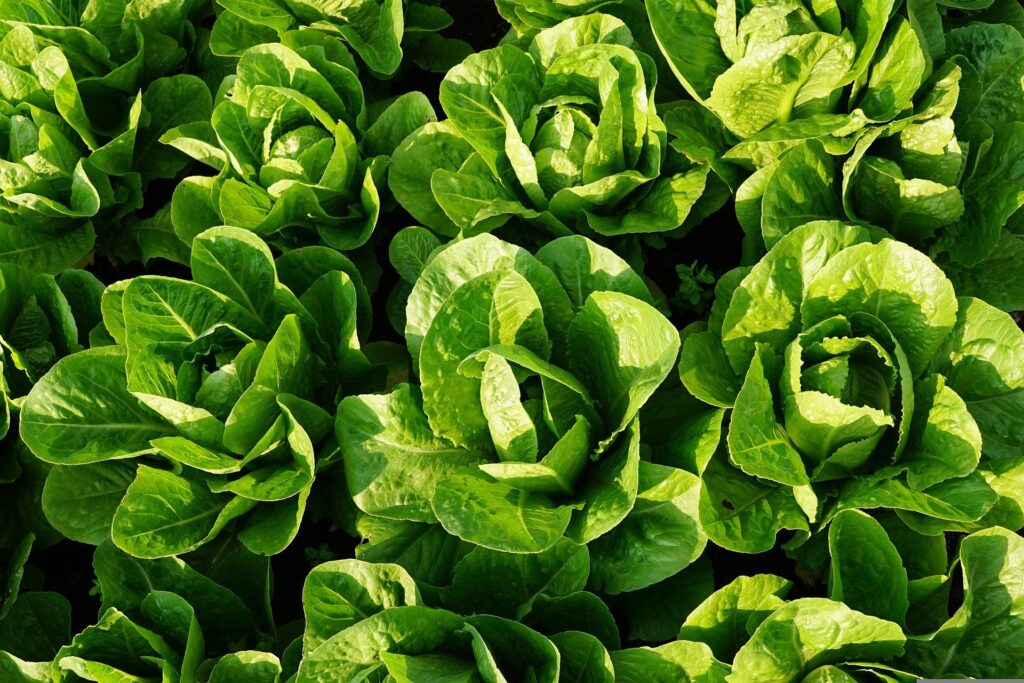
Non-cruciferous dark green leafy veggies are also high on the list because they, too, have super-high vitamin levels. They are packed with fiber and anti-oxidant compounds that help reduce heart inflammation.
These veggies include:
- spinach
- bok choy
- Swiss chard
- watercress
- dandelion
- cilantro
- lettuces
- wheat grass
- barley grass
- beet greens
A mix that contains cruciferous and non-cruciferous green veggie powder is ideal. You can use it every day to get a substantial amount green veggie goodness.
3. Spirulina
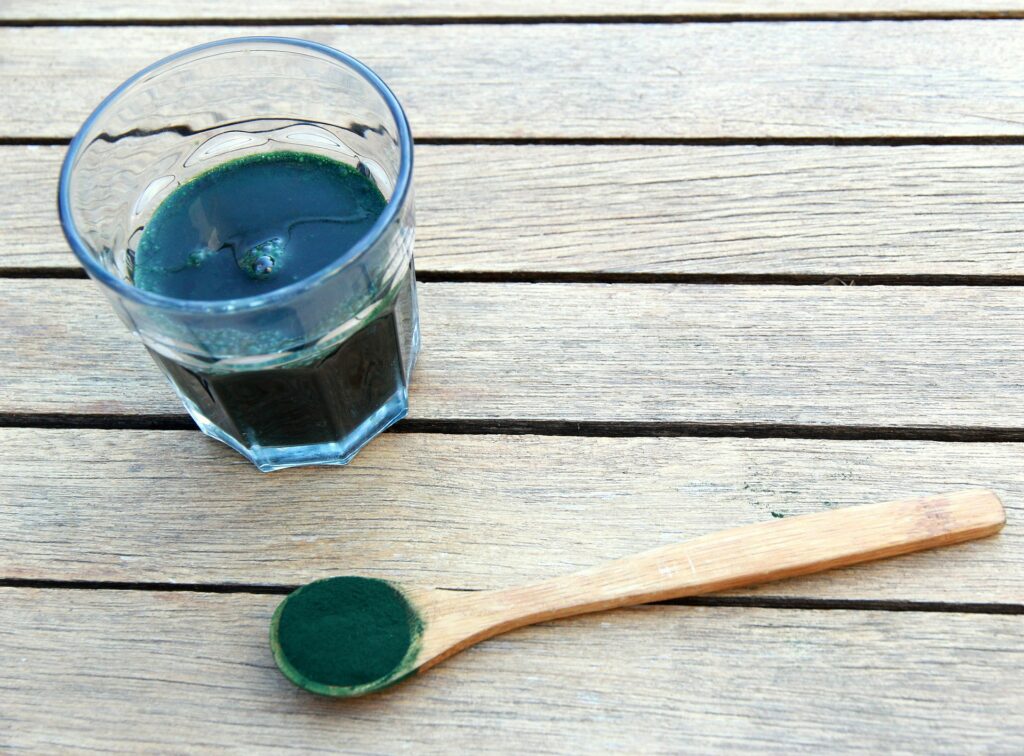
This brilliantly colored blue-green algae powder is chockfull of protein and antioxidants. Phycocyanin, (the phytonutrient that makes spirulina green) is known for its ability to reduce inflammation. It also activates nitric oxide that allows blood to flow more easily. Plus – you’ll get more energy! Spirulina can be taken as a single supplement powder and is often an ingredient in super-greens mixes.
4. Berries, Cherries and Grapes
Blueberries, acai berries, aronia berries, blackberries, raspberries (most “bush berries”) plus cherries and grapes are powerhouses of anti-inflammatory nutrients. Red, purple and blue berries are high in antioxidants that increase nitric acid activity and relax blood vessels.
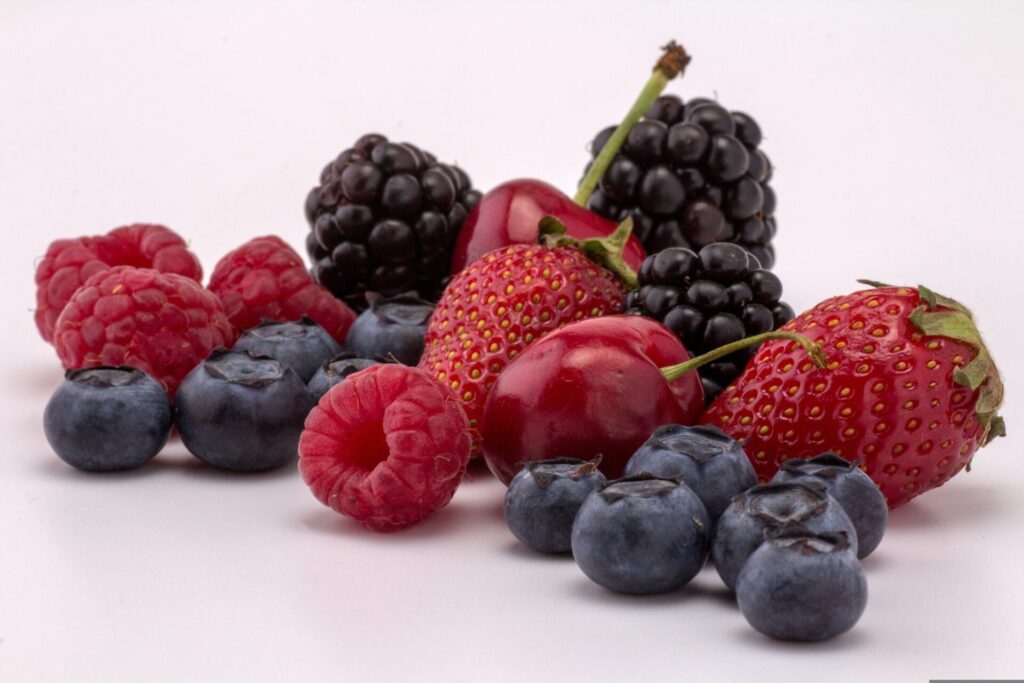
This increased blood flow counteracts inflammation. Berries also contain high amounts of phenols that improve heart function. Everyone should regularly eat lots of fresh berries to prevent heart disease…but, again, if you are already suffering from heart inflammation, you need more than a few berries sprinkled on your cereal in the morning.
As mentioned in the section above on cruciferous vegetables, you may not be able to get enough fresh berries into your meals every day. But – if you also include a spoonful of high concentrated berry powder every day, you can make more headway in reducing heart inflammation. The tastiest way to eat concentrated berry powder is to add it to yogurt, smoothies, protein drinks, oatmeal and overnight oats, pudding – you name it!
5. Fatty Fish/Omega-3 Fatty Acids
Omega-3 acids are fantastic for reducing heart inflammation. They’re found in fatty fish, eggs, edible algae, some vegetables and certain nuts and seeds. Most people who live in North America, South America and Europe don’t get enough omega-3 fatty acids in their diet. It’s not surprising that so many people in these areas suffer from heart disease.
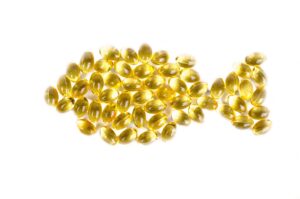
If you want to add more omega-3’s to your diet, the easiest way is to eat more omega-3 rich fish. You’ll want to look for natural wild caught salmon, tuna, mackerel, sardines and other fatty fish, because they contain a higher level of anti-inflammatory nutrients. Farm-raised salmon don’t have the same diet or environment, so they’re less effective for healing.
If you don’t want to eat salmon or other fatty fish every day, try your best to eat fatty fish at least a few times every week. You can also take omega-3 oil supplements. Then you’ll get a measured amount of concentrated omega-3 oil every day.
Omega-3 oil supplements are available in a few different forms.
You can get liquid omega-3 fish oil (like cod liver oil) and take it by the spoonful, but most people don’t really enjoy the taste. And they also don’t appreciate the smell or the “fish burps” they get after taking it.
It’s easiest to take your omega-3’s in soft gel form. That way, you get all the benefit without the unpleasant taste/smell.
Krill Oil
You could also try krill oil, which is super-high in omega-3 fatty acids. Krill are tiny crustaceans that live near the bottom of the ocean. They feast on algae to get their omega-3’s, and they’re different from fish, that contain omega-3 fatty acids. Krill omega-3 oils are more bio-available.
Here’s why: The omega-3 oil in fish oil has to be converted to phospholipids in our bodies before we can make use of it. However, in krill, the omega-3’s are already naturally present in phospholipid form. They’re available to us without requiring an extra process of digestion.
Additionally, krill oil is a more concentrated form of omega-3’s and a lower dosage will accomplish the same as a higher dose of other fish oils. Krill oil also naturally contains astaxanthin and choline.

Astaxanthin is a phytonutrient that contains carotene, a naturally reddish pigment that comes from micro-algae. It’s what makes krill oil red.
Fun fact: It’s also what makes pink flamingos pink! Because flamingos eat such a huge amount of algae and pink shrimp (that also eat the algae)!!
Aside from its pretty color, astaxanthin is a powerful antioxidant that scavenges the free radicals that contribute to heart inflammation.
Choline is understood to be a “macro-nutrient” – sort of in-between a vitamin and a mineral. Choline improves cardiovascular health and reduces inflammation.
So with krill oil, you get the additional benefit of two other nutrients that support heart health, among other excellent health benefits.
Vegan Omega-3 Supplements
If you are vegan or vegetarian, you can take vegan omega-3 oil that comes directly from algae. Vegans comment that it is better and easier on the digestion to get your omega-3’s from algae, rather than by eating the fish that eat the algae.
6. Sweet Potatoes
High fiber sweet potatoes are tasty, healthful root vegetables. They’re often misunderstood as being part of the potato family, but they are part of the morning glory (bindweed) family. Sweet potatoes are great for heart health, as well as having other health benefits.
Sweet potatoes contain about 21% carbohydrates and only an insignificant amount of fat.
They’re high in choline (as mentioned above) that reduces inflammation and provides protection to cellular walls. They are also high in potassium that helps reduce blood pressure.
Darker colored sweet potatoes are high in antioxidant beta-carotene, that helps the cardiovascular system. They are also high in Vitamin C, providing additional health benefits to the eyes and immune system.
7. Hemp seeds, Flax Seeds and Chia Seeds
Hemp seeds, flax seeds and chia seeds are all powerhouse superfoods that are outstanding as heart healthy, anti-cancer, pro-digestion, pro-weight-loss foods.
Hemp Seeds
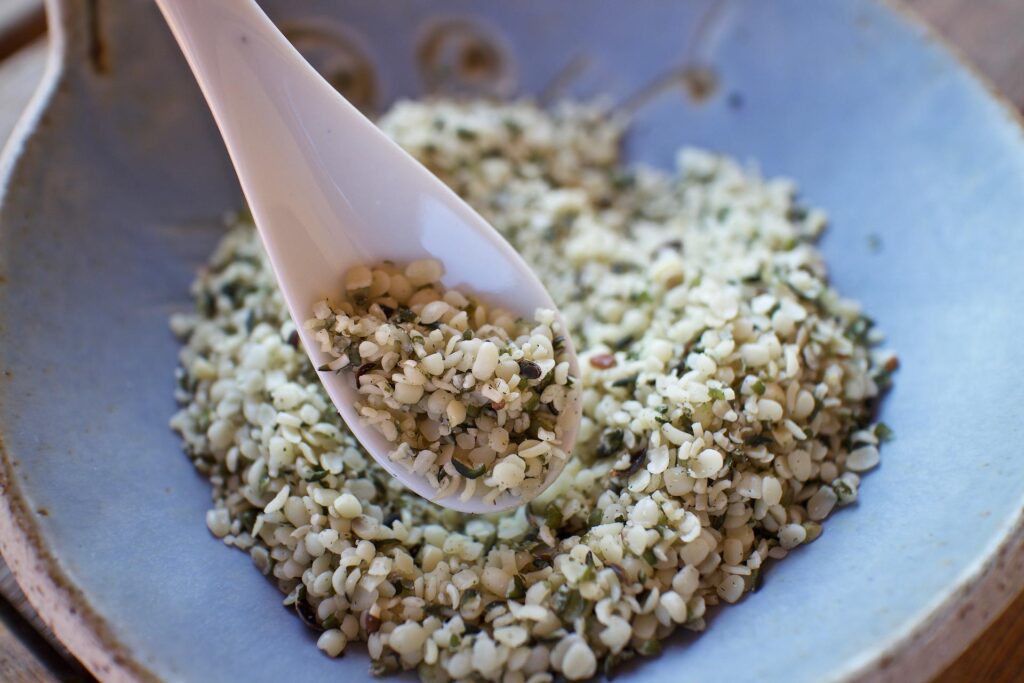
Hemp seeds are a nearly perfect plant-based complete protein. They’re rich in Omega-3 and Omega-6 fatty acids, so you get lots of heart healthy nutrients, plus necessary dietary fiber. Hemp seeds are great for reducing inflammation and boosting immunity, while providing energy and improving brain health.
Pus, they are tasty and can be eaten (hulled) like nutty seeds as a snack, or ground into powder for sprinkling on yogurt, cottage seeds, in smoothies, etc.
Flax Seeds
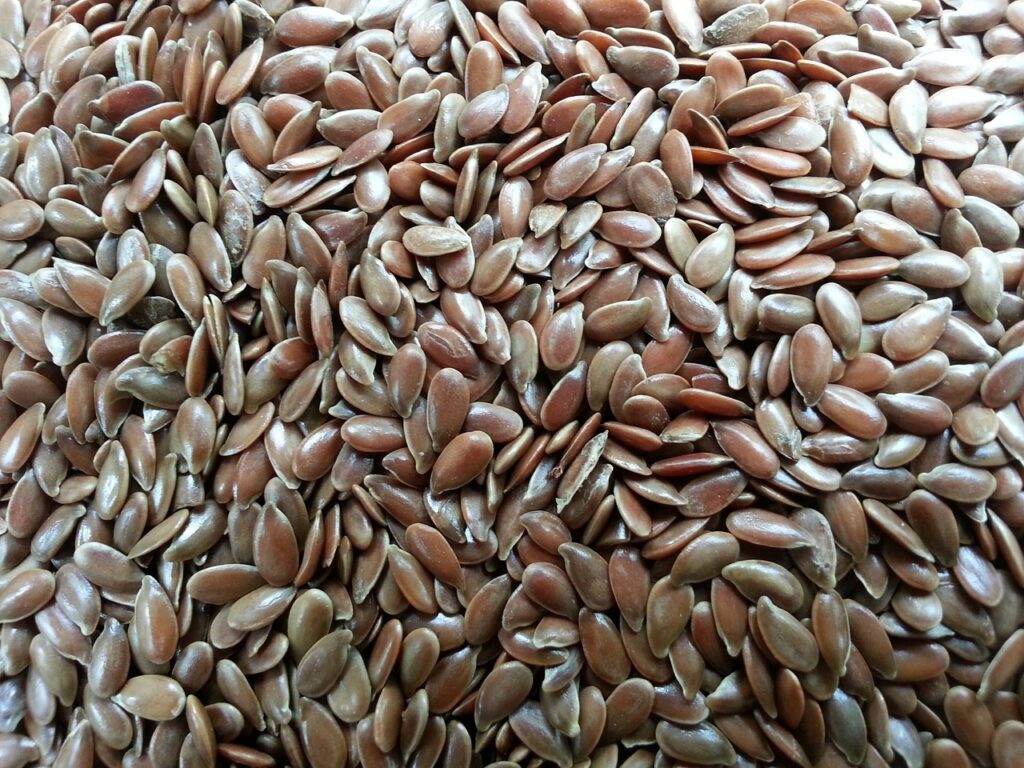
Flax seeds, like hemp seeds and chia seeds, are high in omega-3 fatty acids, perhaps even having more than the other two! They are also highest in ALA (alpha-linolenic acid) that is super anti-inflammatory! Flax seeds should be ground to a powder to gain the most nutrients. You can mix it with yogurt or cottage cheese, in smoothies, or sprinkled on other foods. Flax seeds are high fiber, so they’re also great for weight loss, digestion, autoimmune health and heart health.
Or, you can add flax oil to your diet, as a supplement or as a condiment.
Flax oil is not recommended for cooking due to its low oxidation rate. It’s better used as a drizzle on cooked vegetables or as a replacement for butter on toast. Flax oil should be tightly sealed, refrigerated after opening, and used within six to eight weeks for best freshness.
Note: If you are taking prescription medications, please check with your doctor if you intend to take flax seed oil as a supplement as it could cause interactions with some prescriptions.
Chia Seeds
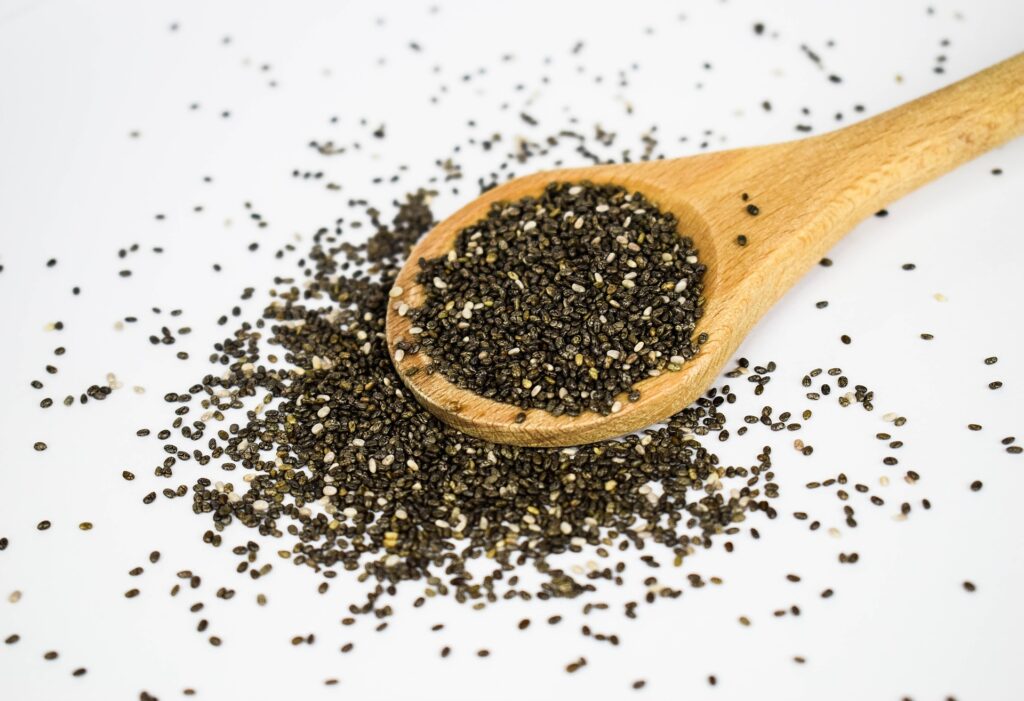
Tiny chia seeds are also packed with omega-3’s and help the heart in many different ways. Their high anti-inflammatory and antioxidant content helps reduce blood pressure and maintain blood cholesterol levels. It’s important to eat chia seeds with a lot of liquid, or they are harder to digest.
Chia seeds are often ground into powder, as are hemp seeds and flax seeds, and mixed into protein drinks, juice, smoothies, etc.
Another popular way to eat chia seeds is to make chia “pudding.” Simply mix chia seeds with some form of milk, (dairy milk or plant milk, like oat or almond milk) fruit, and natural sweetener (optional). After sitting overnight, the chia seeds expand as they absorb the liquid and take on a gel-like texture that sets up like pudding.
8. Olive Oil
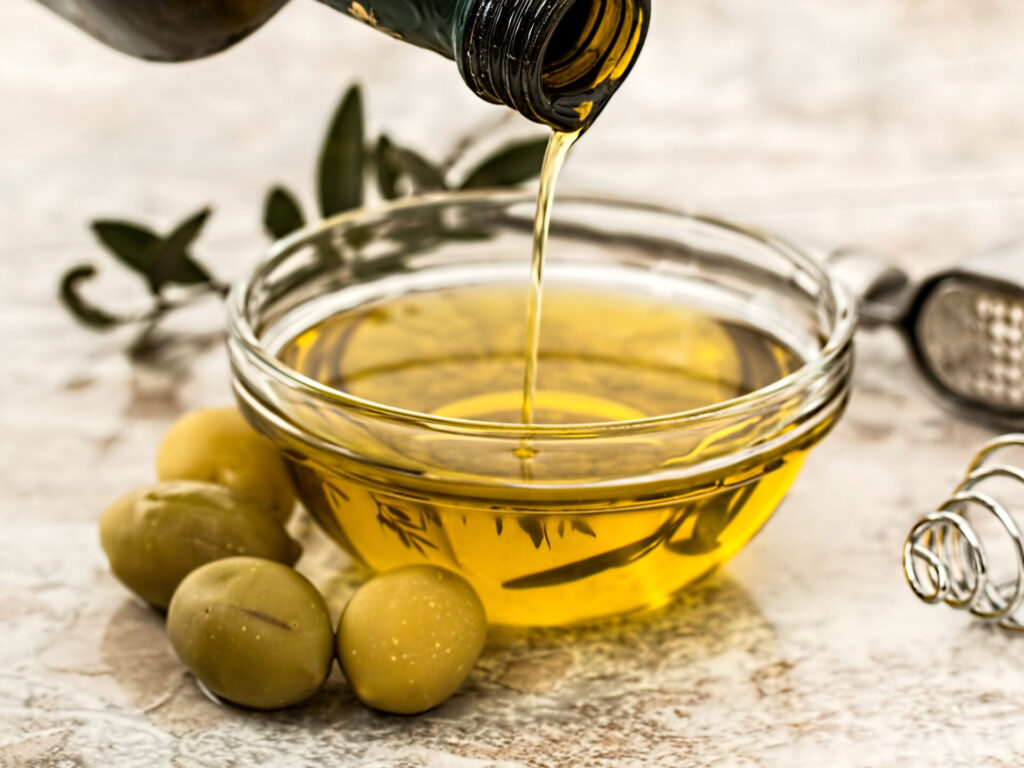
Olive oil has been a main ingredient of the healthy Mediterrean diet for thousands of years. Olive oil contains an abundance of phytonutrients (natural plant chemical compounds) that are fabulous for preventing or treating numerous health issues.
The benefits range from reducing risks of certain cancers to protecting brain health, while reducing risk of heart attack, and lowering cholesterol.
Olive oil is also heart healthy because it contains a rare compound, oleocanthal, that is a strong anti-inflammatory agent.
To reduce heart inflammation, replace other low quality oils in lower heat cooking. However, olive oil is best when drizzled on salads or as a replacement for butter on toast, baked potatoes and other foods.
You don’t want to increase your overall fat intake…just exchange lesser oils for healthy olive oil!
The best grade of olive oil to reduce heart inflammation is cold-pressed, extra virgin olive oil (EVOO). It is the least processed, and contains the most polyphenols and oleic acids. That said, due to the abundant benefits of olive oil, all grades of olive oil outweigh many other cooking oils when it comes to overall health benefits.
9. Almonds
Antioxidant almonds are excellent for reducing heart inflammation and reducing blood cholesterol. They contain unsaturated fatty acids and other plant chemicals known as phytosterols that protect the heart.
Adding an ounce of almonds to your diet every day is a great way to tone down inflammation and reduce heart risks. You can also try adding pistachios and walnuts, but almonds are more effective.
10. Garlic
Another factor in the healthy Mediterranean diet is lots of garlic! Garlic is one of those miracle plants that is antibacterial, antioxidant, anticancer, antiviral and anti-inflammatory.
Garlic’s superpowers are in large part due to allicin, a particular sulfur compound it contains that does most of the heavy lifting for curing diseases.
Garlic is well known to reduce heart inflammation and reduce blood cholesterol, while reducing risk of stroke and heart attack. It also reduces joints and muscle inflammation.
Feel free to add garlic to your diet. Crushing a raw garlic clove and letting it sit for a few minutes will release the allicin. You can then eat the garlic (one to three cloves of raw garlic per day) and gain the benefits. If the idea of eating raw garlic puts you off, you can peel and chop garlic, let it sit for 5-10 minutes to activate the allicin, and then cook it into any recipe.
You can also use garlic to fight infections by making a large jar of “Fire Cider” a home-made herbal oxymel (vinegar recipe). It’s made of vinegar, peppers, ginger, garlic and a few other ingredients. It’s a great antibacterial, immune-boosting anti-inflammatory tonic remedy.
If you don’t happen to like the taste of garlic, you can also take deodorized garlic tablets that also don’t give you “garlic breath.”
11. Functional Mushrooms
Of the thousands of edible mushrooms available in the world, hundreds of them have medicinal value! This group of functional mushrooms go beyond providing the nutrients of culinary mushrooms. They contain amazingly powerful phytonutrients and have been used over millenia for healing serious diseases.
Four of the most powerful functional mushrooms are Reishi, Lion’s Mane, Chaga and Turkey Tail. These mushrooms each have incredible anti-inflammatory properties and successfully treat heart inflammation. They also treat pain-related inflammation that comes with fibromyalgia or rheumatoid arthritis, and brain diseases like Alzheimer’s. These mushrooms also have strong anti-cancer properties.
12. Pineapple/Bromelain
This popular tropical fruit promotes general wellness. It also happens to contain bromelain, an enzyme that treats some serious health problems. Bromelain’s anti-inflammatory actions support cardiovascular health and reduce heart inflammation.
Bromelain’s also reduces pain caused by inflammation and reduces dangerous blood clotting.
Interestingly, bromelain is often promoted as a digestive aid for its benefits when taken with food. However, its ability to reduce inflammation is released when taken in-between meals.
Pineapple can be eaten as often as you like, without any negative side effects, so it’s a great food to add to your diet to fight inflammation. Just eat some pineapple chunks or drink some juice an in-between-meal snack.
If you want to keep a steady supply of bromelain in your system, bromelain supplements can also be taken regularly to counteract inflammation. Dosages are as per packaged recommendations, but may vary depending on specific conditions, weight, etc.
13. Dark Chocolate/Cocoa


Believe it or not, good quality dark chocolate (minimum 70% cacao) is a mineral rich, antioxidant, immune-boosting, anti-inflammatory food. Eating just a little bit (no more than 20 grams, 2-3 times per week) will help ease heart inflammation, plus improve mood and memory.
We’re not talking about junk chocolate here – if you indulge, (for health purposes, of course!) choose a high quality, organic chocolate bar, chocolate chips or cocoa powder. You should also choose a product that is either unsweetened, or sweetened with organic natural cane sugar or another natural whole food sweetener. Choosing chocolate sweetened with synthetic or “undigestable” no-calorie sweeteners is not going to help your health.
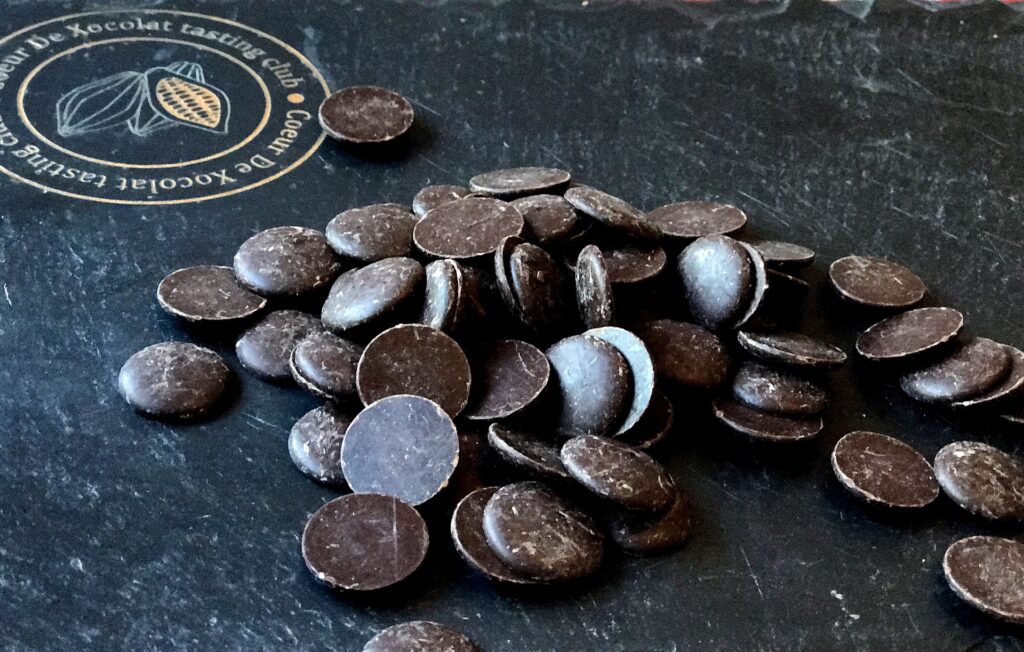
Conclusion
It’s likely that inflammation is at the basis any heart condition. If you’re looking for natural ways to heal your heart, this simple guide to foods that reduce heart inflammation will get you on your way!
Heart inflammation can be a very serious disease and you’ll probably need to approach it from various angles if you want to heal your heart naturally. Changing your diet is a great way to help your heart condition to heal
Disclaimer: This post is for informational purposes only. Any material herein is the expressed opinion of the authors and is not a substitute for professional advice, diagnosis or treatment, nor has it been evaluated by any regulatory agency. All use of information herein is solely at the risk and discretion of the reader. Have a blog? This post is for sale. Contact us.